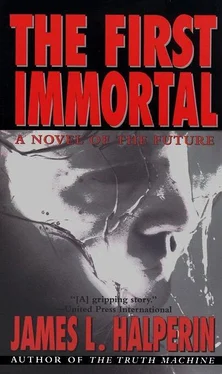If only she could remember who she was.
“Who are you?” she asked us three, almost as a small child might ask visiting friends of her parents.
“Virginia Gonzalez. I’m a neuroscientist; also married to your great-great-granddaughter.”
Virginia’s answer was no shock to Alice, whose reconfigured brain was familiar with modern marriage customs.
“I’m Trip Crane,” I said. “Your great-great-grandson.” Alice recognized my name. Trip Crane, a pioneer of nanotech. But she knew of me only as someone famous.
“And I’m your son, Ben Smith.”
A son? She had a son? Apparently so. But she didn’t know him—at all.
When he grasped her hand, she neither recoiled nor overlapped his hand with her own. She did smile at him, a grateful acknowledgment of his obvious feelings, then saw in his eyes that it was not quite what he’d wanted; needed.
“And who am I ?” She turned toward Virginia for the authoritative answer.
“You’re Alice Franklin Smith. You were born in 1904, frozen in 1990, and revived today: April twenty-second, 2081.”
“Why can’t I remember any of that?” she asked, even as her own mind told her the answer: that poor woman, Alice Franklin Smith! She had simply taken Alice Smith’s place in this world, hadn’t she?
“Unfortunately, “ Virginia explained, “your memory was destroyed in 2017 when terrorists violated your canister.”
Alice’s eyebrows rose. “Oh. But if you tell me enough about myself, they’ll come back—my memories?”
“I’m afraid it never works that way. Once we infuse new knowledge, skills, and patterning, the old memories never return.”
Alice thought: That would make me just like her clone or her twin. Her doppelgänger. Alike, but a brand new person entirely. The real Alice, God rest her soul, was gone.
She pondered the sadness of it, not for herself, but for the other Alice Smith. And, of course, for her son.
“Never?”
“Never in my experience. But there might still be traces of your past life embedded somewhere in those neurons of yours. Maybe enough to affect your personality.”
We four sat speechless, trying our best to absorb and perhaps accept an unalterable reality. It was Alice who broke the silence. “Other than my memory,” she asked Virginia, “I’m healthy now?”
“Yes. Perfectly healthy.”
“And obviously I’m with people who care about me.”
“Yes. Absolutely.”
“Well, Virginia Gonzalez,” Alice Smith said, “if those memories are still there, I’ll find a way to dredge them up. And if they’re not, I suppose I’ll have to make the most of it, won’t I? But either way, I’m pleased to be alive.”
At that moment, Ben decided this woman was definitely Alice Franklin Smith. As far as he was concerned, he had his mother back.
It was the only viewpoint he could bear.
November 3, 2081
—Ringling Brothers, Barnum and Bailey announces the closing of their all-machine circus, as the six-month experiment fails to attract sufficient attendance. “Our experience was similar to that of other entertainment organizations in dance, theater, and athletics,” a spokesman explains. “Although it’s impossible to discern the difference, even VR audiences insist on knowing that the performers are of the genuine flesh-and-blood variety.”—The World Hedonism Conference sets a goal of ending all human (and if possible, all mammalian) suffering on earth by the middle of the third millennium. Conference Chairperson David Pearce explains, “exponential advances in nanotech, eugenics, genetic engineering, and clinical psychopharmacology should give us the power by the year 2500 to induce a permanent state of sublime happiness without impeding survival, or further reducing motivation or creativity.” Separately, the latest Census Bureau statistics suggest that a person’s acceptance of the Hedonistic Creed tends to increase based upon how recently he or she was born.
Dawn broke. Ben had survived 156 years to see this day, the biggest day of his life. It was as though every idea considered, every word spoken, every dream imagined, had led him to now. This exciting yet terrifying notion so energized him that he could barely force himself to remain in bed while the micromachines removed his whiskers and cleansed and dressed his body.
Slightly over six months had passed since Alice’s reviv, and Gary now remained his and her only direct descendant yet on ice. Ben had witnessed the revival of all three daughters and five grandchildren. My grandmother had achieved an especially satisfying outcome: Virginia had repaired Rebecca Crane’s senility without memory loss by flawlessly executing a standard regimen of interpolation memory-reconstruction techniques.
But this would be Ben’s most difficult reviv, and not only because his son’s brain had undergone nearly two hours of ischemic damage. Even if Gary’s memory remained intact, Ben wondered if he could ever build the loving relationship with his son that had eluded him longer than any other father in history. Indeed, reconciliation might be harder if Gary’s immersion in Boston Harbor had not eradicated his memory.
All nine once-frozen Smiths now inhabited a 46,000 cubic foot space in the same Somerville, Massachusetts, residential complex where Ben had lived since 2073. As each new family member had been revived, AI-directed micromachines reconfigured the walls and floors, and arranged appropriate sound and odor shields for maximum privacy, but always at the expense of spaciousness. Each person now had a small room with private adjoining bathroom. They shared two kitchens, a foyer, and a medium-sized dining room/den.
Ben rose in a quick, fluid motion, as if propelled by a tightly wound coil spring. He took only a few steps before the wall separating his bedroom from the common rooms disappeared into the ceiling. He greeted most of the family at breakfast. Only Katie and Jan had yet to join them, and both would certainly arrive momentarily. Communal breakfast was a daily ritual upon which Ben insisted: a house rule.
Ben briefly considered another house rule he’d established: no more than one hour of VR per day. By the standard of the times, it was a draconian regulation, he knew; average consumption worldwide now approached seventy hours per week per person. But there was simply no way that his children were allowed to be average!
“House rule!?” Maxine had shouted at him, just three weeks ago. “House rule? What did you do? Bring us all back so you could be Daddy again? Have a house full of girls to obey and worship you?”
“Wait just a damn minute—” was as far as Ben got.
“No, Daddy dearest, you wait a damn minute. Or a hundred. Or a million. What difference does it make anyway?”
“Oh, come on—”
“No! You go on! Go on forever, if you want. I’ve already been around the big wheel once. What’s the difference if I spend my second trip in a pod? I like it in there!” Maxine had begun to pant-hitching breath, but no sign of tears. “If you brought me back so you could tell me how long I can do VR, like you limited our TV time in the sixties or something, that’s just plain sick. I’m not a child; I’m 129 years old, for chrissake, ninety-two of them conscious! Jesus. You are one sick asshole, you know that?” Then she started strutting; even kicked the wall. “You must’ve done all this just so you could finally get it right. This time. Being Daddy once wasn’t enough, was it? You liked it so much you—”
“Shut up!” Ben bellowed. He hated it, but what choice did he have?
Now Maxine was frozen, suddenly crying, and there’d been something scary about it—like every ounce of moisture might drain from her body through those tear ducts.
Читать дальше












